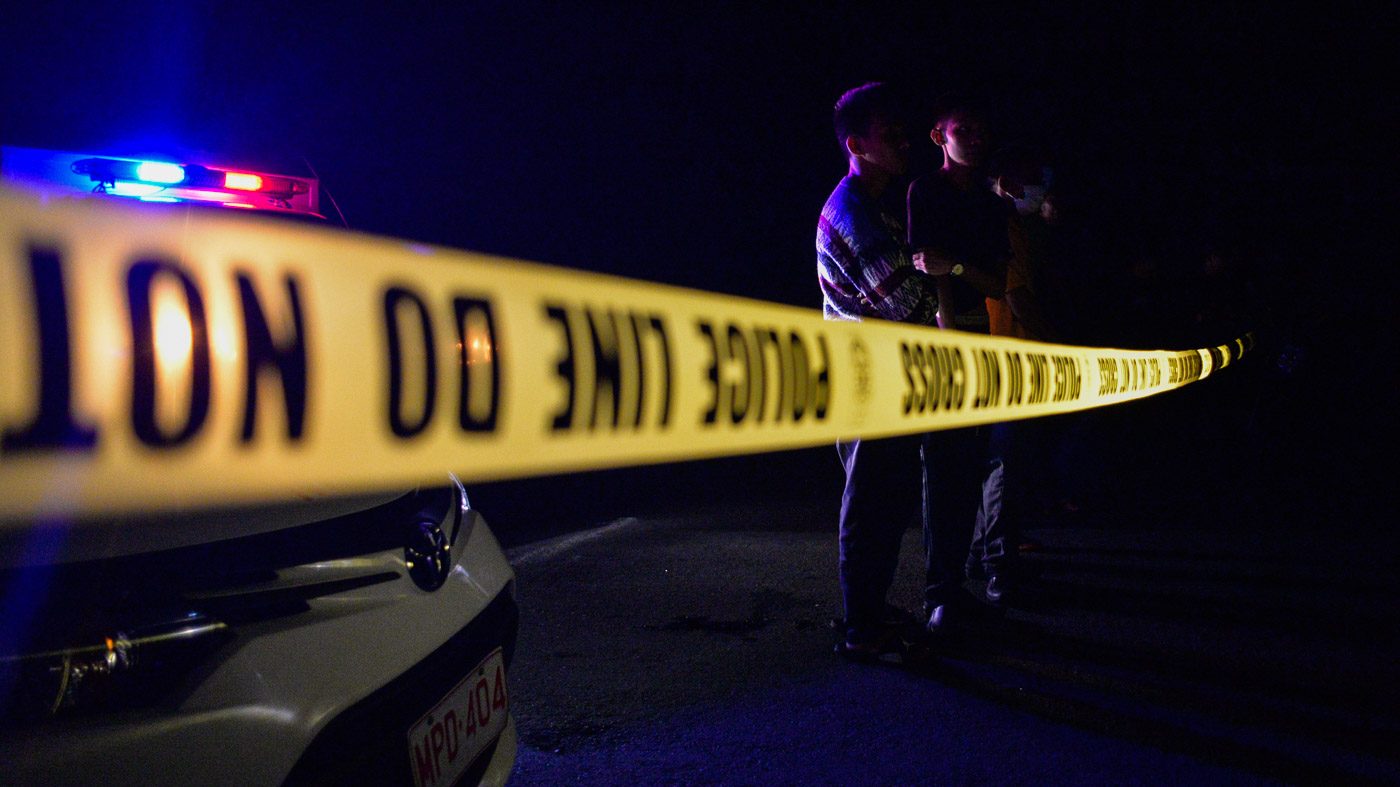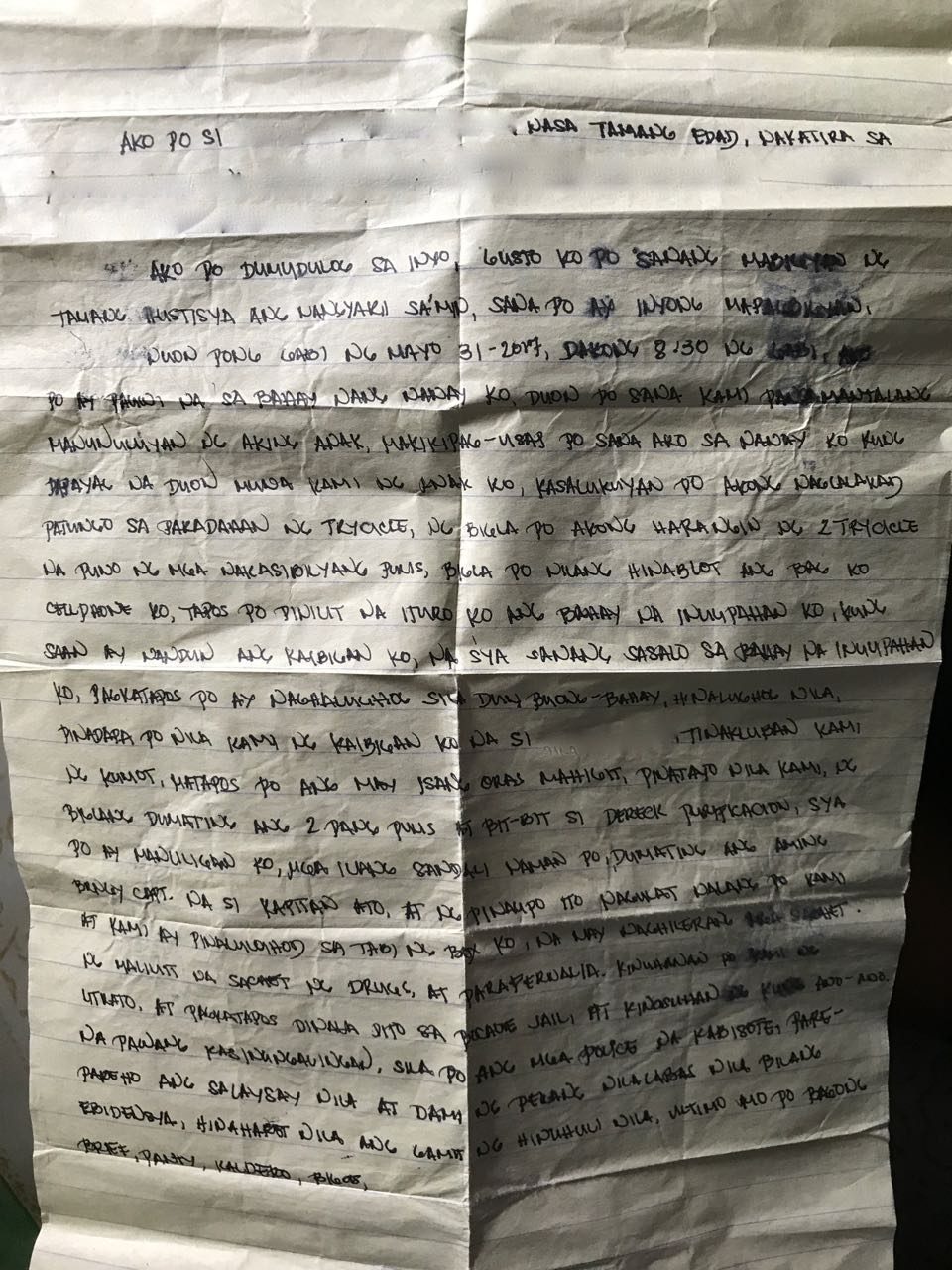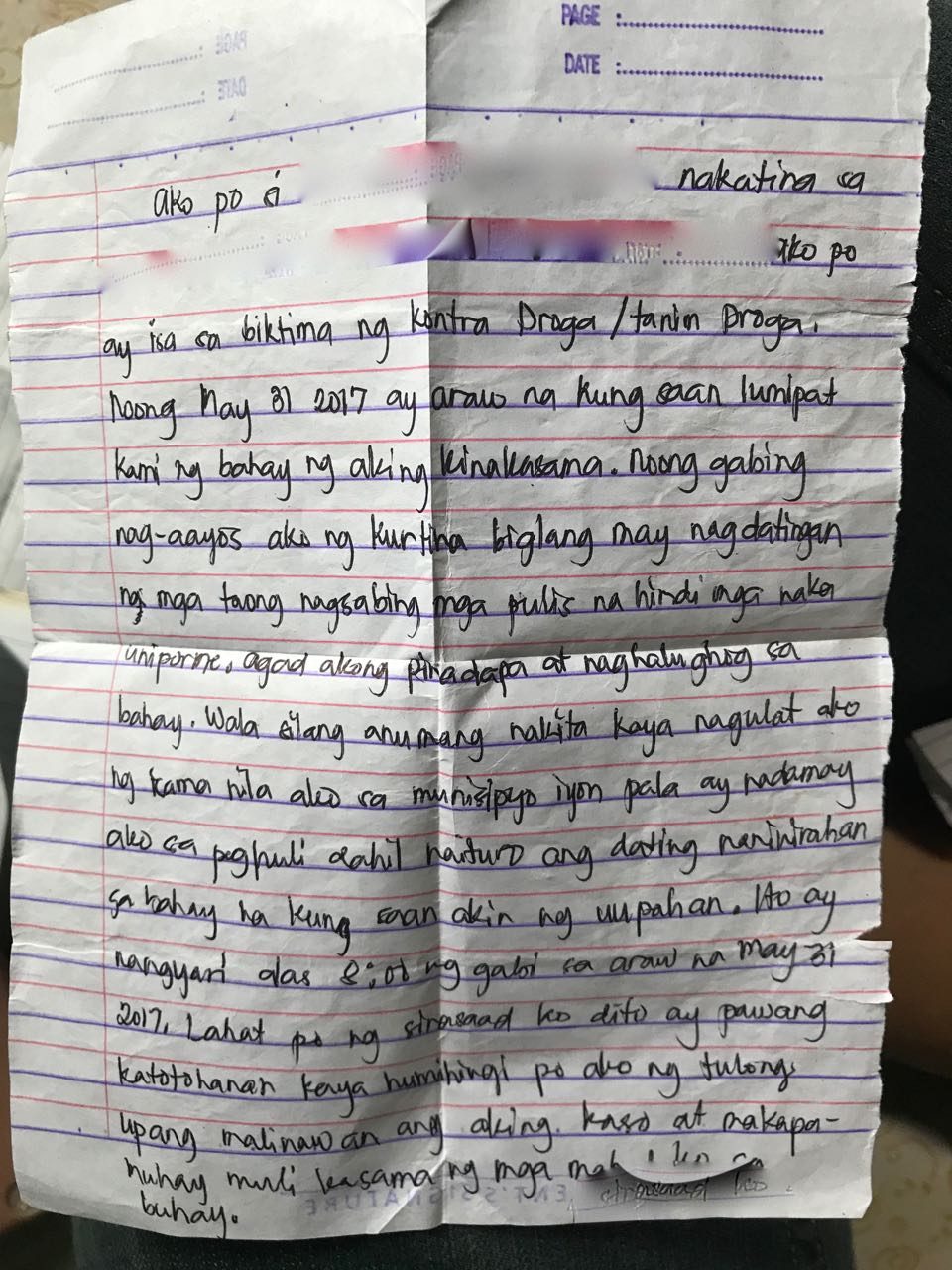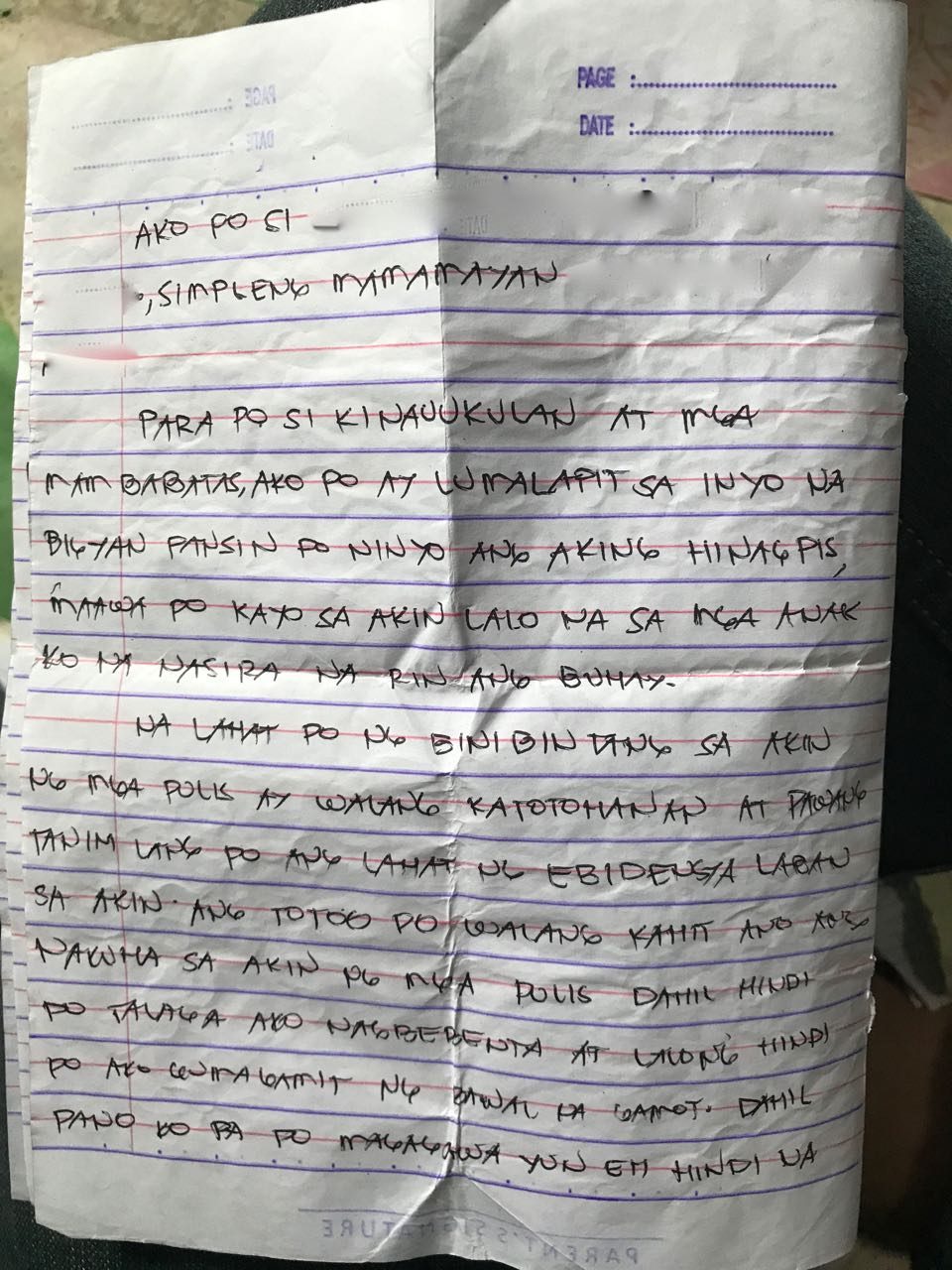SUMMARY
This is AI generated summarization, which may have errors. For context, always refer to the full article.

MANILA, Philippines – The last time *Grace spoke to her daughter, *Jasmine, was over a month ago.
Jasmine was arrested in late June in an anti-drug operation in Bocaue, Bulacan, and has been detained since. Grace wants to visit her but the guards won’t allow it.
“Ayaw po nila akong papasukin eh….Umiikot lang po ako sa may simbahan, may butas po doon, naririnig ko lang po iyong anak ko, ‘Ma, tulungan mo ako,’ sabi niyang ganoon,” she says, breaking into tears.
(They won’t let me in….I only went around, near the church – there’s a hole there. From there, I can hear my daughter saying, “Ma, help me,” she said.)
“May sakit po kasi iyon eh kaya payat na payat. Sabi nila nagdadrugs daw po dahil payat. Hindi naman po, may hika po iyon. Sabi niya, ‘Mama, ayoko dito; ang sikip,’ sabi niya. ‘Di ako makahinga,’ sinisigaw niya lang po sa akin sa may bintana pero di ko po siya nakikita,” Grace adds.
(She’s so thin because she’s sick. They say she’s taking drugs that’s why she’s thin. But that’s not the case. She has asthma. She tells me, “Mama, I don’t like it here; it’s too cramped. I can’t breathe.” She just shouts it to me through the window but I couldn’t see her.)
Grace says Jasmine and her husband used to be drug users but they stopped when President Rodrigo Duterte assumed office. When the police came to Jasmine’s house, they accused her husband of being a drug lord even though they didn’t have money and could barely eat at the time.
“Wala naman pong ginagawa ang anak ko napa-ano lang eh. May nagturo lang po sa kanila ng asawa niya. Nandoon din ‘yung anak ko kaya pati iyong anak ko nadampot,” she said. “Tinaniman daw po sila. Talagang iyong time na po na iyon wala silang kapera-pera talaga.”
(She did not do anything. Someone pointed to her and her husband. My daughter was there so she was also arrested. She said evidence was planted when they were arrested. But during that time, they really had no money.)
Grace is at a loss on where or who to ask for help. Since they only weave rugs for a living, they can’t think of how they can reach out to people in position to help them. (READ: Wake up! Kian’s death shows us drug wars can’t be won)
The drug war has left her family and others in a similar situation feeling helpless and scared. No one in their community plans to complain. “Siguro sa takot na rin po (Maybe out of fear too),” she says.
Living in fear
Bulacan was the hotbed of the “one-time, big time” drug operations that yielded 98 dead suspects and 107 arrests in just 24 hours. Operations continue, with police regularly goind around the streets, residents say. They come in civilian clothes, riding unmarked and unplated vehicles. (READ: How the PNP’s one-time, big-time operations work)
(The police are always going around, always in civlian clothes. They are on motorcycles, two cars, doing rounds.)
Charlie rarely sleeps in their home following his wife’s arrest and the continued monitoring of the police. He fears for his life.
Teresa is detained in the municipal jail. Charlie claims she is a victim of the palit-ulo scheme, where a drug suspect points to another alleged suspect to get lighter charges.
Police nabbed one of their neighbors, notorious for drug use, on the day of Teresa’s arrest. A few minutes later, plainclothes policemen barged into their house without a warrant. They searched their things, grabbed Teresa’s purse, and planted evidence, says Charlie.
“Sinampal po iyong asawa ko ng mga pulis na ‘yan. Hawak po ang anak ko. Sabi ng asawa ko, ‘Nananakit na kayo.’ Sinampal pala iyong asawa ko sa loob ng bahay namin,” he says.
(Those police slapped my wife. They grabbed my child. My wife told them. “You’re hurting us.” They slapped my wife inside our own house.)
Aside from arresting his wife, the police also allegedly took several household items like their digital box, portable DVD player, and 3 broken phones.
Teresa tested negative for drugs but she remains in jail. Charlie says police asked him for P200,000 for “easy release” but he does not know where to get the money, especially now that he can’t report to work in Manila because he visits his wife.
“Karamihan diyan puro tanim, puro tanim, sinasabi sa akin [ng asawa ko] (Most of them were framed up, planted with evidence, my wife tells me),” he says, referring to other detained suspects in the local jail.
Letters
Some detainees, including Jasmine, have written to a community leader to ask for help. They provided details of their arrest.



Rachel’s sister is among those who sent a letter in the hope that someone in authority would listen.
Rachel says that even after the police admitted that her sister was not the suspect they were after, authorities allegedly planted drug packs to justify her arrest and detention.
“Kahit pulis po nagsabi na pasensiya na nga daw kasi damay lang siya kasi nandoon siya sa bahay ng talagang huhulihin. Naghalungkat ng buong bahay, lahat pati damit, lahat ng gamit, wala talagang nakuha sa kapatid ko. Iyong droga daw mismo sa pulis nanggaling,” Rachel says.
(Even the police apologized and said she got dragged in because she happened to be in the house of the real suspect. They searched the whole house, even the clothes, and other items, but they did not get anything. She said the drugs came from the police themselves.)
“Nakiusap nga siya sa kapitan namin na wala ngang nakuha pero yumuko lang daw. Ganoon ang nangyari,” she added.
(She tried to appeal to our barangay captain, and told him that the police didn’t find any drugs on her but all he could do was to look down. That’s what happened.)
Now that they do not know where to ask for help, all they could do is to abide by the process and post the bail to be set by the court, the families say. – Rappler.com
*Real names of subjects concealed upon request.
Add a comment
How does this make you feel?
There are no comments yet. Add your comment to start the conversation.